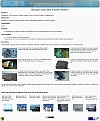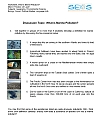Subjects:
Geography, Environmental Science, Social / Political Studies, Language ArtsObjectives:
- General skills: Practising analytical skills; collecting, managing and analysing information; discussion and presentation of
information to an audience.
- More specifically the students will develop a definition of marine pollution. In the process of developing this definition
they will realise
- that the point of view / the thematic focus is an important factor, and
- that definitions given (for example in school books) are not always carved in stone but
can be the result of balancing different aspects and the wish to meet the needs of
different groups of people
- that the point of view / the thematic focus is an important factor, and
Materials:
- Newspaper or magazine articles, information from the internet and/or the library (optional)
- Worksheet for the students:

Online: Online Worksheet "What is Marine Pollution?" and / or 
Printable version (RTF format): Printable Worksheet "What is Marine Pollution?"
Time needed:
- 1 - 2 school lessons for the discussion
- optional: a few hours to prepare the discussion by collecting and reading information about marine pollution
Hints:
The scenarios and roles proposed in the worksheet are meant to lead the students to think about the following aspects when develeoping their definition.
- Human influence
Are only those substances / species released by humans considered to be marine pollutants? - Nature of the pollutant
Does it make a difference WHAT KIND of a substance is spilt? For example whether it is toxic or not? Can natural substances such as oil released from natural seeps be considered to be pollutants at all? - Proximity of the spill to human activities
Is it important WHERE a harmful substance is spilt? Whether this happens near a coast or in the open ocean where it possibly never reaches coastal areas? - Vulnerability of human activities to marine pollution
Which are the domains of human activity that may be affected by marine pollution? (e.g. Health: air pollution, polluted (drinking-)water, poisened fish and other sea food Economy: tourism, leisure, property market, fisheries)
